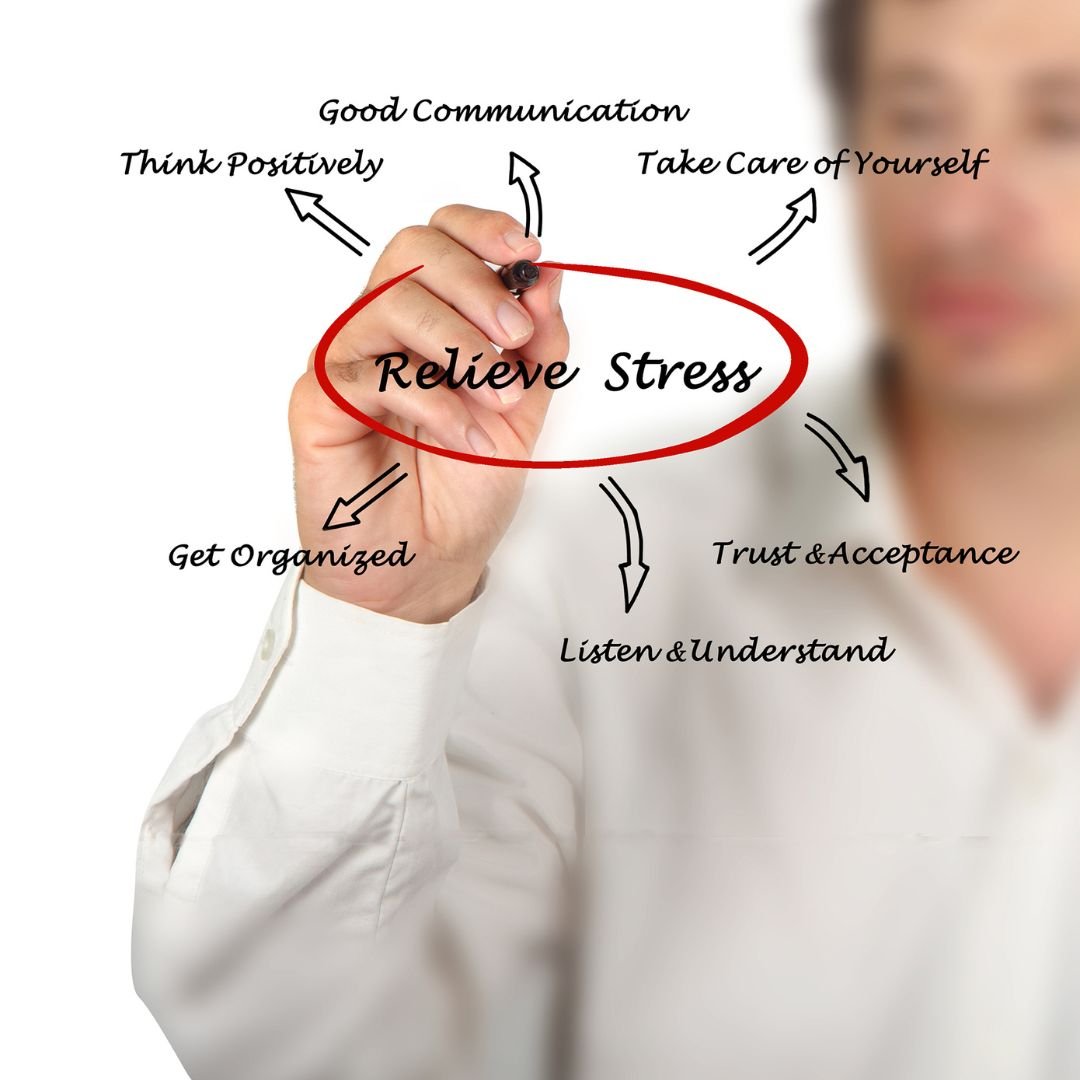When we talk about our lives, time doesn’t remain the same. In our daily routines, we face different types of stress coming from different things and scenarios, and every one of us wants to overcome them. But as our lives get smarter, every problem we are facing has a smart solution, and this is why we are going to discuss a smart solution for stress management, specifically focusing on setting a smart goal for stress management. If we talk about smart, smart means specific, measurable, achievable, relevant, and time-bound.
Smart goals mean setting aside some quiet time each day to lose yourself in a book, making a promise to yourself to take a walk every morning, or choosing to turn off all gadgets like mobile phones an hour before you go to sleep, or any other doable yet challenging goals. These goals are totally personalized to fit what suits you best.

It looks very simple, right? The beauty of it is that you get to decide what steps will make the biggest impact on your stress levels, and then, as time progresses, you will start to see the change in your life in different ways. So let’s dive into the explanation of what smart goals for stress management are and how you can set smart goals for yourself. It’s time to rise and fight against your stress with smart goals!
What Is Stress Management?
Stress management can be defined as approaches to handling the stressful state of mind and body, such as learning skills, problem-solving, time management, focusing on important task-wise approaches, and improving your skills to cope with stressful situations. This includes setting a smart goal for stress management, which involves specific, measurable, achievable, relevant, and time-bound strategies to effectively manage and reduce stress in both personal and professional spheres
What is a smart goal for stress management?
The term SMART was first introduced in 1981. A smart goal for stress management could be to practice mindfulness meditation for 10 minutes every day for the next month.
This goal is specific (practicing mindfulness meditation), measurable (10 minutes daily), achievable (a reasonable amount of time that can fit into your daily routine), relevant (mindfulness meditation is proven to reduce stress), and time-bound (every day for a month).
In addition to understanding what a smart goal for stress management is, we also need to understand stress. Stress can be defined as a state of worry or mental tension caused by a stressful situation.
Stress is a natural response of our body to fight against difficulties and awkward states of affairs. It has been faced by everybody at any time in his life.
Stress may be acute, which is usually brief for a certain period; chronic, which is prolonged for a long period; or episodic, which may be short-term and frequent. There may be another type of positive stress, which can be the result of fun or overexcitement. In the smart goal for stress management, the word SMART is an abbreviation of five words, which are as follows:
- Specific: It means what goal you want to achieve. This is the first stage of setting up your goal and in this stage, you specify what target you want to achieve and define everything related to it.
- Measurable: Tracking your progress is the most important part of any task. This is the second stage, where you decide how you are going to measure your achievement. It is ideal to attach some kind of number to your goal so that you can easily track your progress. For example, instead of saying I will practice deep breathing every day, set a goal of practicing deep breathing for 5 minutes every day.
- Achievable: Achievable means that you should have the skills and abilities to achieve the targeted goal Your goal should be realistic and attainable. While it’s good to push yourself, choosing a goal that’s too ambitious can add more stress. If you’ve never meditated before, starting with 10 minutes a day is more achievable than an hour.
- Relevant: This means the goal is according to your demand and your principal values. Choose goals that will have the most impact on lowering your stress levels.
- Time-bound: Time is a crucial value and must be attached to achieve the goal within a specific period. It is ideal to set a timeframe for your goals. For example, I will practice deep breathing for 5 minutes for the next 3 months or you can divide the time or set it according to your preferences.
SMART Goals for stress Management in 2024
- Getting Enough 8 Hours of Sleep Over the Next 30 Days: Early to bed, early to rise for sufficient sleep. For the next 30 days, I will get eight hours of sleep each night to lower my stress levels. I will avoid any distractions that can disturb my sleep by shutting down all electronic noise.
- Specific: You’ll aim for eight hours of sleep each night, turning off all electronic devices to avoid distractions.
- Measurable: You will track your sleep each night to ensure you’re hitting the eight-hour mark.
- Achievable: Shutting off electronics makes it realistic to avoid distractions and improve sleep quality.
- Relevant: Adequate sleep is key to reducing stress, making this goal directly connected to stress management.
- Time-bound: You have a clear 30-day period to work on this goal, making it timely and focused.
- Deciding continuous three-hour daily study: In addition to university classes & one-hour Cricket in the field to be one of the top three ranking students in his class 2024
- Specific: You are going to study daily so that you can be one of the top three students in a class for the year 2024. You plan to study for three continuous hours daily in addition to attending university classes, and you also plan to play cricket for one hour in the field.
- Measureable: The time you dedicate to both studying and playing cricket is clearly defined, making it easy to track your daily commitment.
- Achievable: The goal is clearly achievable Dedicating specific times for studying and cricket daily is realistic with good time management.
- Relevant: The goal directly supports your target to be among the top three ranking students in your class by 2024, also combining academic status with physical well-being to enhance performance and reduce stress.
- Time bound: The target year is 2024, giving you a clear timeframe to achieve your academic ranking while maintaining a routine of study and cricket.
- Exercise regularly: You are going to do regular daily exercise for 45 minutes in a nearby gym. For the next six weeks, you will stop all other unhealthy activities. The aim is stress management and overall health and fitness
- Specific: You have decided to go to nearby gym for stress management and overall health and fitness
- Measureable: This practice is measurable by exercising for 45 minutes regularly for the next six weeks.
- Achievable: As the time is limited and you have to go to a nearby place you can easily achieve this target
- Relevant: The exercise proved successful under the supervision of an instructor available near your home. It is relevant for you as it will help you achieve your physical health goals.
- Time-based: The smart goal is for 45 minutes and for six weeks only, which is easy to complete
- Listening Therapy by closing your eyes: Voice, Music, and Listening Therapy by closing your eyes, listen Surah E Rahman recited by Qari Abdul Basit Abdusamad three times daily for one week only
- Specific: The patient has set a goal by closing eyes, listening to surah e Rahman and adopting all the spiritual norms and measures for listening therapy for complete cure of incurable diseases like cancer.
- Measureable: The patient insure to listen three times daily for one week only, drink water by remaining closed, and say three times Allah Allah Allah without interval
- Achievable: The patient can easily listen and need only about 20 minutes to complete listening therapy
- Relevant: With the help of deep spiritual impact, most of the patients cured just by listening to one-week therapy three times a day as a treatment, not a religious-based treatment. They were healthy happy and free from all types of stress due to disease
- Time-bound: in this example, the time is fixed as three times listening therapy for consecutive 7 days without interval.
- Electronic device break: You will stop using electronic devices for 1 hour before bedtime for the next four weeks to reduce stress and improve sleep quality.
- Specific: The goal is specified as you have decided you will stop using all the electronic devices just 1 hour before sleep.
- Measureable: The goal is easily measurable as you will stop using all electronic devices for the next six weeks.
- Achievable: Avoiding electronic devices for one hour before bed is a realistic goal that can be achieved with commitment and self-discipline.
- Relevant: The goal directly addresses your aim of reducing stress and improving sleep quality by eliminating the negative impact of screen time before bedtime.
- Time-bound: The goal is set for the next four weeks, providing a specific timeframe for implementing the digital detox routine.
- Social Connections: You will prioritize your social connections and you will meet with your friends and family for 20 minutes daily for the next month.
- Specific: The goals is very specific, as you have decided to meet or interact with your family members or friends for the next month
- Measurable: The goal is quite measurable, as you have to meet your friends and family daily for the next 30 days.
- Achievable: The goals appear to be completely achievable by meeting your friends and family for the next 30 days once a day.
- Relevant: The goal is totally relevant to you, as you are aiming to strengthen your relationships with your friends and family.
- Time-bound: The goal is set for the next month, providing a specific timeframe for implementing the habit of connecting with friends or family members regularly!!!
- Reading a book: You will read a book for 20 minutes before bed each night for the next two weeks to help relax and improve your sleep quality.
- Specific: Goal is specific: you are going to read a book for 20 minutes over the next 14 days to improve your sleep quality and mental health
- Measurable: The goal is also easily measurable, as you are going to read a book for next 14 days
- Achievable: The goal is completely achievable, as you can easily read a book daily for 20 minutes for the next 14 days.
- Relevant: The goal is completely relevant to you, as you are aiming to improve your sleep quality and mental health as well.
- Time-bound: The goal is set for the next 14 days, providing a specific time frame.

Why are smart goals effective?
- You can manage stress and time more effectively with SMART goals.
- SMART Goals help and guide you for priority fixing and time management
- SMART goals framework let’s you divide complex, large goals into smaller, simple goals and task completion done easily
- SMART Goals guide you to monitor progress and other relevant activities
- With The help of SMART goals, you can take action if feel it is necessary
- SMART Goals keep the person motivated
- SMART Goals help to get good / best results
- SMART Goals improve performance and satisfaction
Step-by-step action plan for setting SMART Goals for stress management in 2024
- Identify your goals. Write down your planning, action, evaluation, and evaluation. Identify your goals and articulate them clearly.
- Write down small, smart, efficient criteria and fix two priorities specific to each goal: It’s precise detail for easy formation of an action plan. This means breaking your goals down into specific, measurable, achievable, relevant, and time-bound criteria and then prioritizing each.
- Break down into smaller and manageable sub-goals or assign tasks to each sub-goal: This step involves detailing each goal into smaller, more manageable parts to ensure each can be addressed effectively.
- Further assigning each one a measure to take action, fixing a deadline, & assigning a responsible person means team-creating: For each sub-goal or task, assign specific measures or actions to be taken, set deadlines for these actions, and designate a responsible person or create a team to take charge.
- Fix a plan for each team and an action plan thereof; confirm the steps to be watched; identify resources; and frame the strategies required to achieve goals. Establish a detailed plan for each team or individual responsible for a sub-goal, including the steps to monitor progress, the resources needed, and the strategies to be employed to achieve the goals.
- Identify potential obstacles and solutions thereof. Anticipate potential challenges or obstacles that could hinder progress and plan solutions or contingencies for these issues.
- The above action plan is all practiced before implementing the real plan to be adopted: Before putting the plan into action, practice or rehearse the steps involved to ensure smooth implementation.
- Progress would be routinely checked and prepared by writing each action taken, to be taken, and needful to be done: Keep a regular check on progress by documenting actions taken, actions that need to be taken, and additional requirements to ensure continuous movement towards the goals.
- Fix milestones and achievements: Establish specific milestones within the plan to mark progress and accomplishments as the team moves forward.
- Make a comparison with SMART goals already fixed and with achievement: Regularly compare the progress made with the initial SMART goals set to gauge how closely the team is aligning with or achieving these objectives.
- Make a progress sheet and future action plan needed in the future: Maintain a progress sheet documenting all achievements and actions taken, and use this information to plan future actions or adjustments needed to stay on track.
- Make corrections as needed: Based on the ongoing evaluation of progress compared to the set SMART goals, make any necessary corrections or adjustments to the action plan to ensure the goals are achieved efficiently

Final Thoughts
Setting SMART goals can help you manage stress by providing you with a path to follow while you try to lessen stress in your day-to-day activities.
You can accomplish half of the task by consciously using SMART. The other half demands perseverance and a strong work ethic.
Remember that it’s acceptable to modify your stress management objectives as you go along. The important thing is to keep moving forward on your path to a life free of stress. You’ll notice that stress is occurring less frequently with time.



